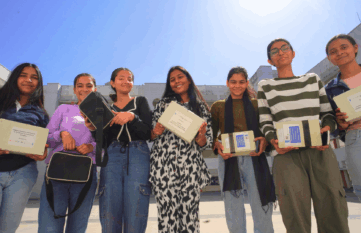Smart sowing: AI for more harvest in Kenya and Uganda

Imagine having access to localized, open-source AI-driven insights that could safeguard farmers’ livelihoods and boost crop yields. That’s precisely what LDRI (Local Development Research Institute) is striving for. By harnessing the power of artificial intelligence, LDRI offers early warning systems tailored to the unique needs of smallholder farmers across Kenya.
The problem they tackle is clear: existing broad-scale early warning systems often fall short in providing actionable information at the local level. LDRI’s innovative tool collects ground data, spanning from farm activities to household demographics, and combines these with satellite imagery to predict crop stress and estimate yields.
Through platforms like WhatsApp, they deliver personalized recommendations to farmers, providing them with crucial information to mitigate risks and enhance productivity.

As LDRI’s AI-driven solutions haven proven their value, the team joined the Open-Source AI Business Mentorship program to progress with their project towards an investable and sustainable business.
On the six-month advisory journey that Villgro Africa and GIZ’s FAIR Forward initiative designed, they gained clarity on their business model, especially given that the data and outputs of their AI are open-source. Working together with their mentor, they were able to identify potential early customers and investors and solidify their value proposition. They have also fine-tuned their market entry strategy and, with insights from the program, will be generating revenue before the end of the year.
M-Omulimisa: AI-based yield forecasts enable loans for farmers
Another obstacle for smallholder farmers who want to realise their agricultural potential is the access to credit. A key ingredient for that is reliable yield data, a valuable data point that farmers often lack.
Addressing this challenge in Uganda, M-Omulimisa offers the AI-based yield forecasting solution “Croppie” to smallholder coffee farmers and cooperatives. By leveraging digital platforms and mobile money, they facilitate seamless lending processes, empowering farmers to invest in essential resources like fertilizers and harvesting tools.
The impact of M-Omulimisa’s work is tangible. In partnership with the Alliance of Bioversity/CIAT and Producers Direct, they’ve facilitated farmers’ access to AI-based yield prediction and actionable agronomic advice. They also acknowledge the need for robust communication and marketing strategies to amplify their reach and ensure consistent messaging across their various channels.
With support from the mentorship program, M-Omulimisa has significantly enhanced their business model, fine-tuning it for market viability. Additionally, they have prototyped a credit-allocation model that leverages the yield predictions, positioning them for accelerated growth and investment opportunities. Reflecting possible risks of such solutions, the mentors have emphasized how safeguards such as placing humans in the loop of such decisions are key to mitigate potential harms.
Finally, the program has also afforded them invaluable insights into open-source AI business models and intellectual property strategies, equipping them with the knowledge needed to navigate these complex landscapes effectively.
Villgro Africa’s Rob Beyer commented, “It has been a wonderful journey walking alongside these committed innovators. The rapid emergence of AI has challenged our thinking and forced us to be even more reactive and inventive in implementing open-source business models that can be leveraged to achieve both impact and sustainability”.
The mentoring programme enters its second round
Receiving ongoing feedback from the five participants and learning what they valued most about the program, GIZ – FAIR Forward and Villgro Africa were quickly determined to launch a second round of the mentorship program.
Now that the methodology of the program has been tested and proven to be effective for these companies, we are excited to launch a second-round hosting six new startups, willing to leverage the benefits of open-source AI technology for their businesses.
Jonas Gramse and Daniel Brumund, project manager at GIZ.
Additionally, Wambui Nyabero from Villgro Africa noted that “Working with GIZ – FAIR Forward and AI startups to apply funding and business models and strategies to open-source AI programs continues to be an excellent opportunity for all stakeholders. Keeping a balance between community impact and sustainability goals is a great way to grow and sustain AI-based enterprises in low- and middle-income countries.”
The organizations that have participated in the Open-Source AI Business Mentorship program have demonstrated that open-source solutions can be both impactful and financially sustainable. By addressing pressing challenges with empathy, ingenuity, and collaboration, they are paving the way for a more equitable and prosperous future in Africa and beyond. Together, they embody the spirit of innovation that transcends boundaries and empowers communities to thrive.




